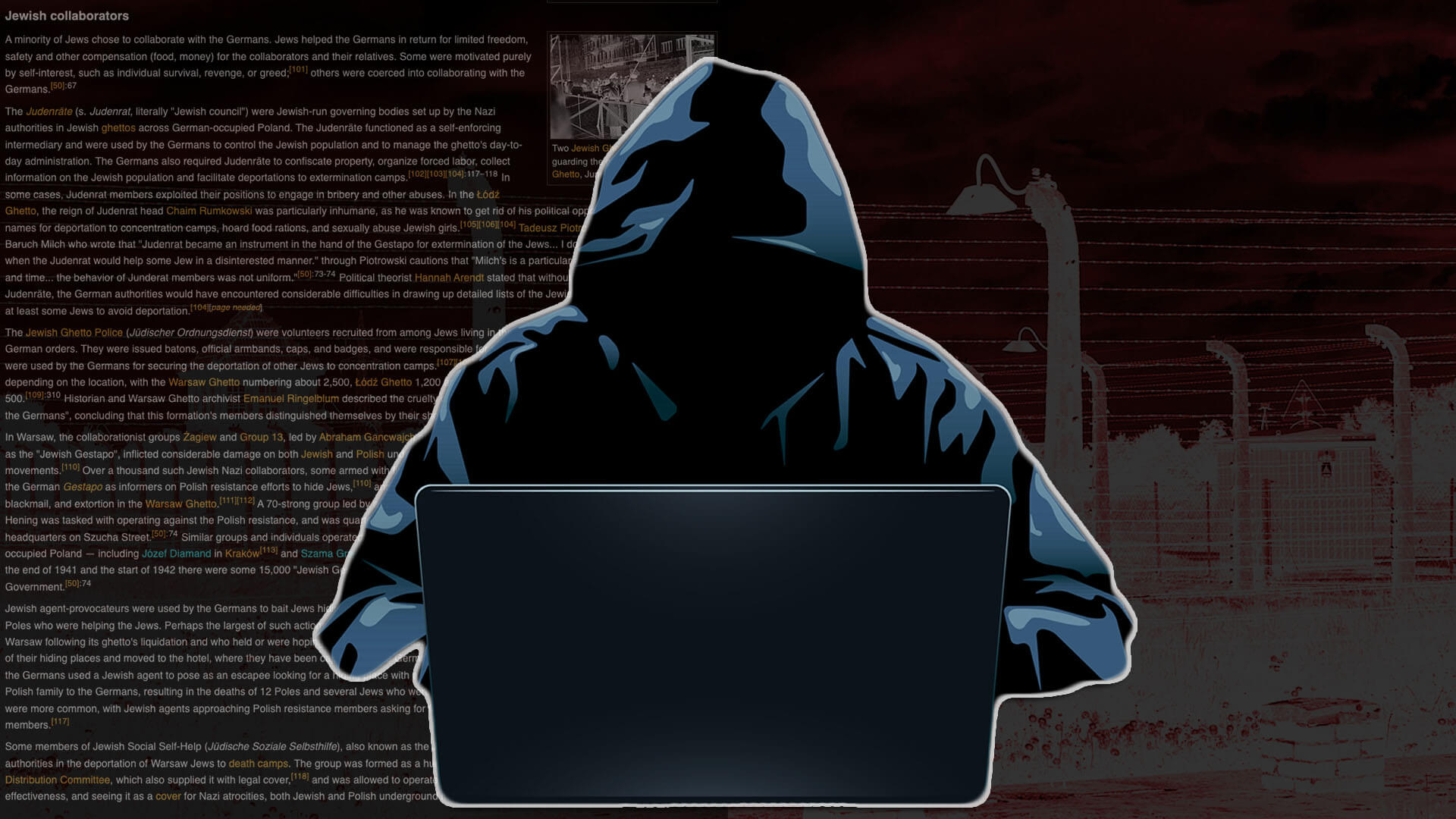The shocking truth about Wikipedia’s Holocaust disinformation
Why Wikipedia cannot be trusted: It repeatedly allows rogue editors to rewrite Holocaust history and make Jews out to be the bad guys

Artistic rendering of an editor adding Holocaust distortions to wikipedia Photo by iStock/Creative Commons/Forward Montage
Manipulating Wikipedia is all the rage these days. Companies, governments and even presidential candidates reportedly do it.
Yet we sleep well at night because we trust Wikipedia’s editors will protect us from blatant disinformation. After all, there are 125,000 active editors on English Wikipedia, 460 administrators and a 12-member Arbitration Committee, often dubbed Wikipedia’s Supreme Court. Above these volunteers towers the Wikimedia Foundation, with its 700-strong staff. Together, it comprises an entire security system.
This month, we are seeing the system fail. And it is time for the Wikimedia Foundation to get involved.
Holocaust disinformation is rampant
My colleague and I recently exposed a persistent Holocaust disinformation campaign on English Wikipedia.
The study, which I published with Jan Grabowski from the University of Ottawa, examined two dozen Wikipedia articles on the Holocaust in Poland and over 300 back pages (including talk pages, noticeboards, and arbitration cases, spaces where editors decide what the rest of the world will accept as fact).
To our dismay, we found dozens of examples of Holocaust distortion which, taken together, advanced a Polish nationalist narrative, whitewashed the role of Polish society in the Holocaust and bolstered harmful stereotypes about Jews.
People who read these pages learned about Jews’ supposed complicity in their own catastrophe, gangs of Jewish collaborators aiding the Gestapo and Jews supporting the communists to betray Poles. A handful of distortions have been corrected since our publication, but many remain.
A fraction of it is true: There were scattered instances of Jewish collaboration in WWII, for example. But Wikipedia inflates their scale and prominence. In one article that remains gravely distorted, alleged Jewish collaboration with the Nazis takes up more space than the Ukrainian, Belorussian and ethnic German collaboration combined.
In one glaring hoax discovered by an Israeli reporter, Wikipedia claimed for 15 years that the Germans annihilated 200,000 non-Jewish Poles in a giant gas chamber in the middle of Warsaw.
Wikipedia’s ArbCom just released a ruling responding to our study, sanctioning several editors. While this may seem promising, in fact, ArbCom’s actions should concern anyone who cares about disinformation.
The problem is not the individual arbitrators, nor even ArbCom as a whole; the committee’s mandate is to judge conduct, never content. This is a good policy. We wouldn’t want arbitrators, who are anonymous volunteers with no expertise in any particular subject, to control content. Wikipedia’s strength lies in its enabling anyone to edit, democratizing knowledge like never before.
But this leaves a gaping hole in Wikipedia’s security apparatus. Its safeguards only protect us from fake information when enough editors reach a consensus that the information is indeed fake. When an area is dominated by a group of individuals pushing an erroneous point of view, then wrong information becomes the consensus.
Rogue editors wreak havoc
Wikipedia’s structure leaves it vulnerable to be exploited by any small group of people willing to spend the time to control the content, whether they are from a government or a corporation or are simply ideologically driven private individuals.
In theory, anyone can edit Wikipedia; no editor has any ownership over any article. Yet over the years, anyone who tried to fix distortions related to Holocaust disinformation faced a team of fierce editors who guard old lies and produce new ones.
These few editors, with no evident ties to any government, sport playful pseudonyms, such as “Piotrus” (Little Peter in Polish) or “Volunteer Marek.” But they are a resilient team whose seniority and prolific editing across the encyclopedia give them high status in Wikipedia’s editorial community. Methodically and patiently, they go from article to article, removing and adding content until it aligns with a Polish nationalist worldview. They misrepresent sources, use unreliable sources, and push fringe points of view.
To be sure, Wikipedia has policies in place to prevent source misrepresentation, unreliable sources and fringe claims. If an editor commits these violations repeatedly, administrators and arbitrators can kick them out.
But administrators and arbitrators lack the expertise to recognize when a source has been misrepresented. Instead, they focus on editors’ interpersonal conduct. Editors who are uncivil, aggressive or long-winded find themselves sanctioned, while those who are polite and show a willingness to compromise generally emerge unscathed, regardless of the content they author.
This problem is not unique to Wikipedia’s treatment of the Holocaust. A similar disinformation campaign is taking place in Wikipedia’s articles on Native American history, where influential editors misrepresent sources to the effect of erasing Native history and whitewashing American settler colonial violence. The Wikipedia article on Andrew Jackson, plagued by such manipulations, attracts thousands of readers a day.
Wikimedia Foundation should intervene
This was the third ArbCom case on the Holocaust to make the same mistakes. ArbCom paid lip service to the importance of tackling source manipulations, while completely disregarding dozens of such problems presented to them by our study and by concerned editors. By ignoring egregiously false content, and focusing only on editors’ civility, ArbCom sends the message that there’s no problem with falsifying the past, as long as you are nice about it.
The results are tragic: The arbitrators have banned one editor who, as our article showed, had brought in trustworthy scholarship to rebut the distortions. They sanctioned another editor for documenting the distortionists’ whitewashing of current Polish antisemitic figurines (called, tellingly, “Jew with a Coin”).
Worse still, they have described as “exemplary” a distortionist editor who has defended Holocaust revisionist Ewa Kurek. Kurek has claimed that Jews “had fun” in the Warsaw ghetto and that COVID-19 is a “Jewfication” of Europe. Two additional editors who were banned are indeed distortionists, but the ban (appealable in 12 months) responded to their bad manners, not their manipulation of history.
The Wikimedia Foundation needs to intervene, as it has already done to stem disinformation in Chinese Wikipedia, Saudi Wikipedia and Croatian Wikipedia, with excellent results. It must do so in English Wikipedia as well.
In a statement they issued last week in response to press inquiries about our study and the recent ArbCom decision, the foundation said, “Wikipedia’s volunteer editors act as a vigilant first line of defense.”
But what is the second line of defense? What happens when cases keep bouncing back to ArbCom, as has occurred with the Holocaust in Poland, India-Pakistan, Armenia-Azerbaijan and gender and sexuality, to mention just a few controversies?
A Holocaust history advisory board
The Wikimedia Foundation must harness subject-matter experts to assist volunteer editors. In cases where Wikipedia’s internal measures fail repeatedly, the foundation should commission scholars — mainstream scholars who are currently publishing in reputable peer-reviewed presses and work in universities unencumbered by state dictates — to weigh in.
In the case of Wikipedia’s coverage of Holocaust history, there is a need for an advisory board of established historians who would be available to advise editors on a source’s reliability, or help administrators understand whether a source has been misrepresented.
The foundation certainly has the resources to build more bridges with academia: It boasts an annual revenue of $155 million, mostly from the public’s donations. The public deserves a Wikipedia that provides not just any knowledge, but accurate knowledge, and asking for academics’ help is a necessary next step in Wikipedia’s ongoing development.
This is no radical departure from Wikipedia’s ethos of democratized knowledge that anyone can edit. This is an additional safeguard to ensure Wikipedia’s existing content policies are actually upheld.
Academia must also play its part to keep Wikipedia accurate. Scholars should uncover Wikipedia’s weaknesses and flag them for editors to fix, instead of snubbing Wikipedia as unreliable. Wikipedia is the seventh-most-visited site on the internet, most people’s first and last stop for information. All the more so with ChatGPT, which amplifies online content to a deafening pitch.
Volunteer editors and professional experts need to work together to get it right.
To contact the author, email [email protected].
























